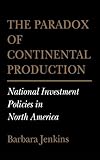The Paradox of Continental Production : National Investment Policies in North America / Barbara Jenkins.
Material type: TextSeries: Cornell Studies in Political EconomyPublisher: Ithaca, NY : Cornell University Press, [2018]Copyright date: ©1993Description: 1 online resource (240 p.)Content type:
TextSeries: Cornell Studies in Political EconomyPublisher: Ithaca, NY : Cornell University Press, [2018]Copyright date: ©1993Description: 1 online resource (240 p.)Content type: - 9781501731280
- 332.6/73/097
- online - DeGruyter
| Item type | Current library | Call number | URL | Status | Notes | Barcode | |
|---|---|---|---|---|---|---|---|
 eBook
eBook
|
Biblioteca "Angelicum" Pont. Univ. S.Tommaso d'Aquino Nuvola online | online - DeGruyter (Browse shelf(Opens below)) | Online access | Not for loan (Accesso limitato) | Accesso per gli utenti autorizzati / Access for authorized users | (dgr)9781501731280 |
Browsing Biblioteca "Angelicum" Pont. Univ. S.Tommaso d'Aquino shelves, Shelving location: Nuvola online Close shelf browser (Hides shelf browser)

|

|

|

|

|

|

|
||
| online - DeGruyter Conflict of Interests : Organized Labor and the Civil Rights Movement in the South, 1954–1968 / | online - DeGruyter The Foundation of Rome : Myth and History / | online - DeGruyter American Literature and the Culture Wars / | online - DeGruyter The Paradox of Continental Production : National Investment Policies in North America / | online - DeGruyter Provincial Modernity : Local Culture and Liberal Politics in Fin-de-Siècle Hamburg / | online - DeGruyter Hume, Holism, and Miracles / | online - DeGruyter A Fistful of Rubles : The Rise and Fall of the Russian Banking System / |
Frontmatter -- Contents -- Preface -- 1. The Interaction between the State and the Market -- 2. Regulating Foreign Direct Investment -- 3. The Regulation of Foreign Direct Investment in the United States -- 4. Canada: A Small State with a Hegemon's Mentality -- 5. Mexico's Apertura -- 6. Policy Alternatives -- Appendix 1. Canadian Decisions on Foreign-Investment Applications by Sector, 1978–1985 -- Appendix 2. Areas Restricted to Foreign Investors in Mexico -- Index
restricted access online access with authorization star
http://purl.org/coar/access_right/c_16ec
Should national governments regulate foreign investment? The question is hotly contested in today's international trade debates. Barbara Jenkins here addresses this complex issue in a timely account of market relationships among North American nations.Jenkins provides up-to-date, detailed analyses of foreign investment regulations and policies in Canada, Mexico, and the United States. She identifies inherent contradictions in the general tactic that all three countries have pursued-simply relying on the pressures of the market rather than planning active strategy—and she assesses the likely effects on foreign investment of the recently concluded Canada—U.S. Free Trade Agreement and the potential North American free trade agreement. Free trade and the absence of adjustment policy, she argues, expose key political actors such as business and labor too broadly to market forces. The result is a projectionist reaction on the part of these domestic actors, which ultimately defeats efforts to liberalize trade and investment relations.In current approaches to foreign investment regulation, Jenkins detects divergent trends among the three countries: while Ottawa and Mexico City continue to liberalize their investment strategies, Washington is growing more interventionist. She shows, however, that the interventionism of the United States reflects a nationalistic trend rather than a commitment to a coherent strategy. Cautioning that the conclusion of a North American free trade agreement will only exacerbate the inadequacies of current policies, Jenkins concludes by offering recommendations for future action.The Paradox of Continental Production will be stimulating reading for policymakers, political economists, and other observers of Canadian, Mexican, and U.S. politics.
Mode of access: Internet via World Wide Web.
In English.
Description based on online resource; title from PDF title page (publisher's Web site, viewed 26. Apr 2024)


